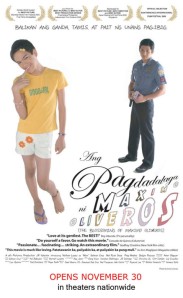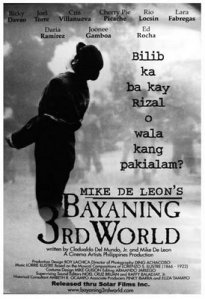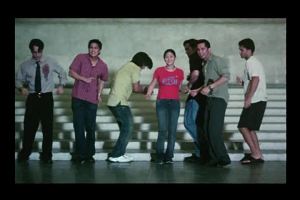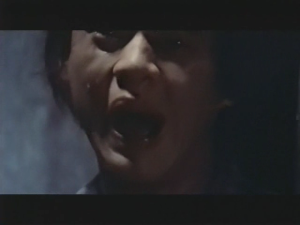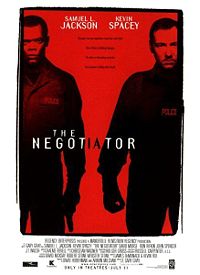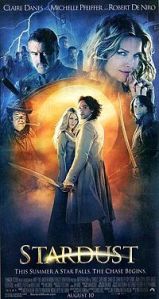Director: Christopher Nolan
Running time: 140 minutes
Synopsis and Evaluation
“It’s not who I am underneath, but what I do that defines me.”
In the previous Batman films made by Burton and Schumacher, Batman/Bruce Wayne was relegated to a mere superhero only as means that would eradicate the antagonists. He was just the archetype superhero who tries to put a lid on a container holding a menace, a monster inside. It’s almost as if Batman/Bruce Wayne is not the most important character, and is just there to complete the ensemble cast. The main attraction of the previous Batman films was its villains — The Joker in Batman, Penguin in Returns and The Riddler in Forever. Batman Begins shifted the focus to Batman himself. In Begins, Batman takes center stage.
 I don’t like to compare Begins with the previous incarnations of the series but I’m compelled to do it to draw attention to how Nolan changed the approach in handling the series.
I don’t like to compare Begins with the previous incarnations of the series but I’m compelled to do it to draw attention to how Nolan changed the approach in handling the series.
The underdevelopment of the Batman character in the previous films was my biggest gripe about them. It’s not as if Batman’s persona is uninteresting to explore and relay — in fact, I find Batman’s personality very complex and to some degree, subterranean. He’s in the open on this one… a full-blown account of his emotions, the way he thinks, his fears, his past, his origins and his motivations. We see Batman at his fullest. We were able to delve into his personal life — the intricacies that make him a very interesting character.
“The world is too small for a man like Bruce Wayne to simply disappear. No matter how deep he chooses to sink.”Batman is humanized in Begins. We do not feel that he’s distant from us, that he’s different from us. We feel like he’s just like us… one of us. Remove his wealth, influence, costumes and weapons, he’s human after all. It should be because he’s Bruce Wayne after all, a mere mortal with a different agenda than the rest of us fellow mortals.
He’s not presented here as a one-dimensional superhero character but someone who has emotional depth; someone who is not stoic; someone who is not just the stereotypical “billionaire superhero” but an individual which has his own battles within himself.
Just like us, he has his own fears and has some trouble facing or eradicating them from his system (“To manipulate the fear in others you must first master your own.”). What does he really fear the most? Bats? Criminals? Or himself for his thirst for revenge?
Just like us, he’s confused about what he’s destined to in this world. What’s his purpose? What should he accomplish (“If you make yourself more than just a man, if you devote yourself to an ideal and if they can’t stop you, you become something else entirely – legend, Mr. Wayne.”)?
Just like us, he has his own share of failures. He must learn to accept them, stand up and continue (“Why do we fall Bruce? So we can learn to pick ourselves up.”). He has weaknesses. He commits blunders. Just like us, he’s not perfect and will never be.
Just like us, he must make big decisions. Should he join the League of Shadows? Should he kill criminals? Should he destroy Gotham City which has already become a living hell? Just like us, these decisions can make or break him.
And beneath his mask, who is he really? Or is Rachel Dawes correct when she said that Batman’s/Wayne’s real face is what the criminals now fear? Just like us, he doesn’t know who he truly is. We suffer the same predicament, an identity crisis, during a point in our lives. More often than not, we battle such predicament all our lives. This is Batman’s struggle within him (“My anger outweighs my guilt.”). He wrestles his desires, emotions and personal satisfaction against the greater/common good where morals play a huge part in molding how he thinks and acts. Just like us, he’s an individual with a multi-layered human psychology.
“Strange injuries a non-existent social life, these things beg the question as to what exactly does Bruce Wayne do with his time and his money.”
“And what does someone like me do?”
“Drive sports cars, date movie stars, buy things that are not for sale… who knows, Master Wayne? You start pretending to have fun, you might even have a little by accident.”
This is also the first time where we see in detail how Bruce Wayne lives the dual life inherent with having a superhero side. We see him sleep until the broad daylight emits beneath his bedroom windows (“Bats are nocturnal.” “Bats may be but even for billionaire playboys, three o’clock is pushing it. The price of leading a double life, I fear.”). We see him bringing women who are galloped by each of his arms to a party, buying restaurants and hotels and swimming in a pool which purpose is aesthetically rather than functionality. He is not the prim and proper, goody-good gentleman we saw in previous Batman films. He is flamboyant and proud with a tinge of spunk and bravado. He is a different Bruce Wayne this time. He hides his Batman side and protect people not by running away nor blending unnoticeably with the crowd to change into his costume but by sarcasm and fake speeches (To all of you,, all you phonies, all of you two-faced friends, you sycophantic suck-ups who smile through your teeth at me, please leave me in peace. Please go. Stop smiling. It’s not a joke. Please leave. The party’s over. Get out.”).
“People need dramatic examples to shake them out of apathy, and I can’t do that as Bruce Wayne. As a man, I’m flesh and blood. I can be ignored, I can be destroyed. But as a symbol, I can be incorruptible. I can be everlasting”
In the eyes of many, Bruce Wayne is just a billionaire who is a son of a philanthropist. He does not strike fear to anyone. No one will believe he can change Gotham City. How true. This is the reason why he looked for a symbol so that he can drive Gotham City’s people to fight and change the status quo.
People need to have heroes or examples to act drastically. We had Rizal to trigger our battles against the Spaniards. Yes, there were numerous battles against the colony before Rizal’s exploits but he became an inspiration to Filipinos — a source of hope for our floundering nation.
We endured Ninoy’s death before we ousted the dictatorship of Ferdinand Marcos. Ninoy is a symbol for our continuous fight against oppression. His death triggered the nation’s emotions that led to the first People Power.
They are symbols. They are inspirations. They are embodiments for our battles against injustice and tyranny.
Like the Philippines, Gotham City is in dire need of a hero. Public officials are bribed to handcuff their own wrists and shut their mouths. Corruption, greed, crime, drugs are just some of the problems lingering in our country… in Gotham City. Just like Gotham City, we are in a situation where we need somebody like Batman to protect us from the oppressors. He’s strong. He strikes fear to the tormentors of justice — something not present in our society because the tormentors hold the power, influence and wealth which are things that Batman/Bruce Wayne has.
The Final Word
We see Batman at his weakest, most discombobulated and most fragile. We see what he thinks. We think about what he sees. We are able to hear the beats of his heart. We see the human aspect of this oft-misunderstood superhero. It makes us reflect within ourselves about who we really we are; who we want to be; what we want to accomplish during the course of our lives. It asks a lot of questions about how we think and act. It triggers self-introspection… it motivates us to examine ourselves. This is a very powerful film that manages to hold my attention and encourages me to think. This is a great character study. This is the definitive Batman movie for me.

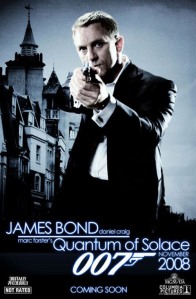 Quantum of Solace, the sequel to Casino Royale, features the second outing of Daniel Craig as Agent 007. It’s the first James Bond movie that requires viewing of the previous Bond film to grasp the movie’s storyline.
Quantum of Solace, the sequel to Casino Royale, features the second outing of Daniel Craig as Agent 007. It’s the first James Bond movie that requires viewing of the previous Bond film to grasp the movie’s storyline.